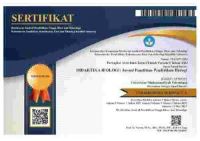PERSEPSI REWARD TERHADAP MOTIVASI BELAJAR MAHASISWA PENDIDIKAN BIOLOGI
Abstract
Reward mempunyai peran penting dalam mempertahankan ataupun membangun motivasi belajar mahasiswa karena dianggap salah satu penentu keberhasilan selama mengikuti perkuliahan. Penelitian ini bertujuan untuk menganalisis motivasi belajar mahasiswa pendidikan biologi dari strata satu (S1) dan strata dua (S2) ditinjau dari pemberian reward selama perkuliahan. Data dikumpulkan menggunakan kuesioner online tentang persepsi mahasiswa secara umum dan khusus terhadap reward yang diadaptasi dari Lloyd (2007). Selanjutnya, data dianalisis secara kuantitatif untuk menjelaskan persepsi dari 190 mahasiswa pendidikan biologi yang terdiri dari 177 mahasiswa strata satu (S1) dan 13 mahasiswa strata dua (S2). Hasil menunjukkan bahwa seluruh mahasiswa pendidikan biologi setuju dan termotivasi untuk belajar ketika diberikan reward saat perkuliahan. Meskipun persentase tipe reward yang diharapkan berbeda, seperti reward nilai sebesar 50%, pemberian semangat/pujian 23%, lalu 20 % berupa hadiah, sedangkan bentuk lain 7%. Selain itu mahasiswa umumnya lebih memilih diberitahu jika ada reward dibanding diberikan secara spontan. Perbedaan spesifik antara mahasiswa S1 dengan S2 terlihat saat pemilihan khusus jenis reward, dimana mahasiswa S1 lebih memilih nilai sedangkan mahasiswa S2 lebih mengharapkan adanya pengayaan materi, pembimbingan, serta pemberian sumber literatur yang dapat membantu tugas mereka. Penerapan reward yang disesuaikan dengan tingkat pendidikan mahasiswa dapat menjadi acuan dalam mendorong semangat belajar mahasiswa selama perkuliahan.
Reward plays an essential role in supporting or increasing student learning motivation because it is believed as one of contributing factors to students' performance in lectures. This study intended to analyze how rewarding students in classes influences undergraduate (S1) and postgraduate (S2) degrees in biology education students' motivation to learn. The data was gathered utilizing a Lloyd-adapted online survey (2007) regarding students' perceptions of rewards in general and particular. Furthermore, 190 biology education students, consisting of 177 undergraduate students (S1) and 13 postgraduates (S2), had their perceptions addressed through quantitative analysis. The results indicated that all biology education students believed that rewards during lectures motivate them to learn. Although the percentage of the type of reward intended varies, such as a reward in the form of a score was 50%, encouragement or praise was 23%, then 20% was in the form of a gift, while other forms were 7%. In addition, students generally prefered to be informed if there was a reward compared to being given it spontaneously. When deciding on a specific reward, it was evident that postgraduate students differed significantly in their choices. Whereas undergraduate students prioritized grades or scores, postgraduate students expected more material enrichment, mentoring, and the provision of literature resources to assist with their assignments. Implementing rewards that are relevant to the educational level of the students can be a reference for enhancing their interest in lectures.
Keywords
Full Text:
PDFReferences
Afzal, H., Ali, I., Khan, M. A., & Hamid, K. (2010). A Study of University Students’ Motivation and Its Relationship with Their Academic Performance. International Journal of Business and Management, 5(4), 80–88. https://doi.org/10.5539/ijbm.v5n4p80
Cerasoli, C. P., Nicklin, J. M., & Ford, M. T. (2014). Intrinsic Motivation and Extrinsic Incentives Jointly Predict Performance: A 40-Year Meta-Analysis. Psychological Bulletin, 140(4), 980–1008. https://doi.org/10.1037/a0035661
Deci, E. L., Koestner, R., & Ryan, R. M. (1999). A Meta-Analytic Review of Experiments Examining the Effects of Extrinsic Rewards on Intrinsic Motivation. Psychological Bulletin, 125(6), 627–668. https://doi.org/10.1037//0033-2909.125.6.627
Deci, E. L., & Ryan, R. M. (1985). The General Causality Orientations Scale: Self-Determination in Personality. Journal of Research in Personality, 19(2), 109–134. https://doi.org/10.1016/0092-6566(85)90023-6
Deci, E. L., & Ryan, R. M. (2017). Self-Determination Theory Basic Psychological Needs in Motivation, Development, and Wellness. The Gulford Press.
Dogan, U. (2015). Student Engagement, Academic Self-Efficacy, and Academic Motivation as Predictors of Academic Performance. Anthropologist, 20(3), 553–561. https://doi.org/10.1080/09720073.2015.11891759
Eckes, A., & Wilde, M. (2019). Structuring Experiments in Biology Lessons through Teacher Feedback. International Journal of Science Education, 41(16), 2233–2253. https://doi.org/10.1080/09500693.2019.1668578
Fischer, C., Malycha, C. P., & Schafmann, E. (2019). The Influence of Intrinsic Motivation and Synergistic Extrinsic Motivators on Creativity and Innovation. Frontiers in Psychology, 10(FEB), 1–15. https://doi.org/10.3389/fpsyg.2019.00137
Fong, C. J., Patall, E. A., Vasquez, A. C., & Stautberg, S. (2019). A Meta-Analysis of Negative Feedback on Intrinsic Motivation. Educational Psychology Review, 31(1), 121–162. https://doi.org/10.1007/s10648-018-9446-6
Froiland, J. M., & Worrell, F. C. (2016). Intrinsic Motivation, Learning Goals, Engagement, and Achievement in a Diverse High School. Psychology in the Schools, 53(3), 321–336. https://doi.org/10.1002/pits.21901
Hoffmann, K. F., Huff, J. D., Patterson, A. S., & Nietfeld, J. L. (2009). Elementary Teachers’ Use and Perception of Rewards in the Classroom. Teaching and Teacher Education, 25(6), 843–849. https://doi.org/10.1016/j.tate.2008.12.004
Jovanovic, D., & Matejevic, M. (2014). Relationship between Rewards and Intrinsic Motivation for Learning – Researches Review. Procedia - Social and Behavioral Sciences, 149, 456–460. https://doi.org/10.1016/j.sbspro.2014.08.287
Jurisevic, M., Glazar, S., Pucko, C. R., & Devetak, I. (2008). Intrinsic Motivation of Pre-service Primary School Teachers for Learning Chemistry in Relation to Their Academic Achievement. International Journal of Science Education, 30(1), 87–107. https://doi.org/10.1080/09500690601148517
Kaiser, L. M., Großmann, N., & Wilde, M. (2020). The Relationship between Students’ Motivation and Their Perceived Amount of Basic Psychological Need Satisfaction–a Differentiated Investigation of Students’ Quality of Motivation Regarding Biology. International Journal of Science Education, 42(17), 2801–2818. https://doi.org/10.1080/09500693.2020.1836690
Lammers, W. J., & Smith, S. M. (2008). Learning Factors in the University Classroom: Faculty and Student Perspectives. Teaching of Psychology, 35(2), 61–70. https://doi.org/10.1080/00986280802004586
Leenknecht, M., Wijnia, L., Köhlen, M., Fryer, L., Rikers, R., & Loyens, S. (2021). Formative Assessment as Practice: The Role of Students’ Motivation. Assessment and Evaluation in Higher Education, 46(2), 236–255. https://doi.org/10.1080/02602938.2020.1765228
Lei, S. A. (2010). Intrinsic and Extrinsic Motivation: Evaluating Benefits and Drawbacks form College Instructors’ Perspectives. Journal of Instructional Psychology, 37(2), 153–160. Retrieved from http://doughertyconsulting.com/Psychology_Course_Resources/documents/Motivation%20and%20Learning%20Articles/Intrinsic%20and%20Extrinsic%20Motivation%20and%20Learning.pdf
Lloyd, K. L. (2007). 151Quick Ideas to Recognize and Reward Employees. The Career Press. www.careerpress.com
Mabbe, E., Soenens, B., De Muynck, G. J., & Vansteenkiste, M. (2018). The Impact of Feedback Valence and Communication Style on Intrinsic Motivation in Middle Childhood: Experimental Evidence and Generalization across Individual Differences. Journal of Experimental Child Psychology, 170, 134–160. https://doi.org/10.1016/j.jecp.2018.01.008
Marchetti, A., Baglio, F., Castelli, I., Griffanti, L., Nemni, R., Rossetto, F., Valle, A., Zanette, M., & Massaro, D. (2019). Social Decision Making in Adolescents and Young Adults: Evidence From the Ultimatum Game and Cognitive Biases. Psychological Reports, 122(1), 135–154. https://doi.org/10.1177/0033294118755673
Niemiec, C. P., & Ryan, R. M. (2009). Autonomy, Competence, and Relatedness in the Classroom: Applying Self-Determination Theory to Educational Practice. Theory and Research in Education, 7(2), 133–144. https://doi.org/10.1177/1477878509104318
Ropohl, M., & Rönnebeck, S. (2019). Making Learning Effective–Quantity and Quality of Pre-Service Teachers’ Feedback. International Journal of Science Education, 41(15), 2156–2176. https://doi.org/10.1080/09500693.2019.1663452
Ryan, R. M., & Deci, E. L. (2020). Intrinsic and Extrinsic Motivation from a Self-Determination Theory Perspective: Definitions, Theory, Practices, and Future Directions. Contemporary Educational Psychology, 61(xxxx), 101860. https://doi.org/10.1016/j.cedpsych.2020.101860
Skinner, E., Saxton, E., Currie, C., & Shusterman, G. (2017). A Motivational Account of the Undergraduate Experience in Science: Brief Measures of Students’ Self-System Appraisals, Engagement in Coursework, and Identity as a Scientist. International Journal of Science Education, 39(17), 2433–2459. https://doi.org/10.1080/09500693.2017.1387946
Taylor, G., Jungert, T., Mageau, G. A., Schattke, K., Dedic, H., Rosenfield, S., & Koestner, R. (2014). A Self-Determination Theory Approach to Predicting School Achievement over Time: The Unique Role of Intrinsic Motivation. Contemporary Educational Psychology, 39(4), 342–358. https://doi.org/10.1016/j.cedpsych.2014.08.002
DOI: https://doi.org/10.32502/dikbio.v6i2.5462
Copyright (c) 2023 Marlina Ummas Genisa, Haryanti Putri Rizal, Hasri, Andi Agussalim, Djohar Maknun
Didaktika Biologi: Jurnal Penelitian Pendidikan Biologi is indexed by:

Didaktika Biologi: Jurnal Penelitian Pendidikan Biologi is licensed under a Creative Commons Attribution-ShareAlike 4.0 International License.







